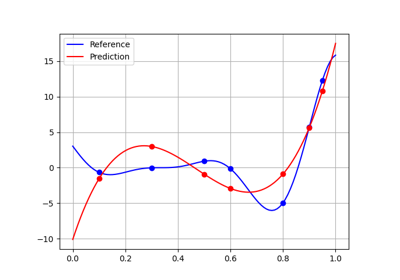r2_measure module¶
The R2 to measure the quality of a regression algorithm.
The r2_measure module
implements the concept of R2 measures for machine learning algorithms.
This concept is implemented through the R2Measure class
and overloads the MLErrorMeasure._compute_measure() method.
The R2 is defined by
where \(\\hat{y}\) are the predictions, \(y\) are the data points and \(\\bar{y}\) is the mean of \(y\).
- class gemseo.mlearning.quality_measures.r2_measure.R2Measure(algo, fit_transformers=True)[source]
Bases:
MLErrorMeasureThe R2 measure for machine learning.
- Parameters:
algo (MLRegressionAlgo) – A machine learning algorithm for regression.
fit_transformers (bool) –
Whether to re-fit the transformers when using resampling techniques. If
False, use the transformers of the algorithm fitted from the whole learning dataset.By default it is set to True.
- compute_bootstrap_measure(n_replicates=100, samples=None, multioutput=True, seed=None, as_dict=False, store_resampling_result=False)[source]
Evaluate the quality measure using the bootstrap technique.
- Parameters:
n_replicates (int) –
The number of bootstrap replicates.
By default it is set to 100.
samples (list[int] | None) – The indices of the learning samples. If
None, use the whole learning dataset.multioutput (bool) –
Whether the quality measure is returned for each component of the outputs. Otherwise, the average quality measure.
By default it is set to True.
seed (int | None) – The seed of the pseudo-random number generator. If
None, an unpredictable generator will be used.as_dict (bool) –
Whether the full quality measure is returned as a mapping from
algo.output namesto quality measures. Otherwise, the full quality measure as an array stacking these quality measures according to the order ofalgo.output_names.By default it is set to False.
store_resampling_result (bool) –
Whether to store the \(n\) machine learning algorithms and associated predictions generated by the resampling stage where \(n\) is the number of bootstrap replicates.
By default it is set to False.
- Returns:
The value of the quality measure.
- Return type:
NoReturn
- compute_cross_validation_measure(n_folds=5, samples=None, multioutput=True, randomize=True, seed=None, as_dict=False, store_resampling_result=False)[source]
Evaluate the quality measure using the k-folds technique.
- Parameters:
n_folds (int) –
The number of folds.
By default it is set to 5.
samples (list[int] | None) – The indices of the learning samples. If
None, use the whole learning dataset.multioutput (bool) –
Whether the quality measure is returned for each component of the outputs. Otherwise, the average quality measure.
By default it is set to True.
randomize (bool) –
Whether to shuffle the samples before dividing them in folds.
By default it is set to True.
seed (int | None) – The seed of the pseudo-random number generator. If
None, an unpredictable generator is used.as_dict (bool) –
Whether the full quality measure is returned as a mapping from
algo.output namesto quality measures. Otherwise, the full quality measure as an array stacking these quality measures according to the order ofalgo.output_names.By default it is set to False.
store_resampling_result (bool) –
Whether to store the \(n\) machine learning algorithms and associated predictions generated by the resampling stage where \(n\) is the number of folds.
By default it is set to False.
- Returns:
The value of the quality measure.
- Return type:
MeasureType
- evaluate_bootstrap(n_replicates=100, samples=None, multioutput=True, seed=None, as_dict=False, store_resampling_result=False)
Evaluate the quality measure using the bootstrap technique.
- Parameters:
n_replicates (int) –
The number of bootstrap replicates.
By default it is set to 100.
samples (list[int] | None) – The indices of the learning samples. If
None, use the whole learning dataset.multioutput (bool) –
Whether the quality measure is returned for each component of the outputs. Otherwise, the average quality measure.
By default it is set to True.
seed (int | None) – The seed of the pseudo-random number generator. If
None, an unpredictable generator will be used.as_dict (bool) –
Whether the full quality measure is returned as a mapping from
algo.output namesto quality measures. Otherwise, the full quality measure as an array stacking these quality measures according to the order ofalgo.output_names.By default it is set to False.
store_resampling_result (bool) –
Whether to store the \(n\) machine learning algorithms and associated predictions generated by the resampling stage where \(n\) is the number of bootstrap replicates.
By default it is set to False.
- Returns:
The value of the quality measure.
- Return type:
NoReturn
- evaluate_kfolds(n_folds=5, samples=None, multioutput=True, randomize=True, seed=None, as_dict=False, store_resampling_result=False)
Evaluate the quality measure using the k-folds technique.
- Parameters:
n_folds (int) –
The number of folds.
By default it is set to 5.
samples (list[int] | None) – The indices of the learning samples. If
None, use the whole learning dataset.multioutput (bool) –
Whether the quality measure is returned for each component of the outputs. Otherwise, the average quality measure.
By default it is set to True.
randomize (bool) –
Whether to shuffle the samples before dividing them in folds.
By default it is set to True.
seed (int | None) – The seed of the pseudo-random number generator. If
None, an unpredictable generator is used.as_dict (bool) –
Whether the full quality measure is returned as a mapping from
algo.output namesto quality measures. Otherwise, the full quality measure as an array stacking these quality measures according to the order ofalgo.output_names.By default it is set to False.
store_resampling_result (bool) –
Whether to store the \(n\) machine learning algorithms and associated predictions generated by the resampling stage where \(n\) is the number of folds.
By default it is set to False.
- Returns:
The value of the quality measure.
- Return type:
MeasureType
- SMALLER_IS_BETTER: ClassVar[bool] = False
Whether to minimize or maximize the measure.
- algo: MLSupervisedAlgo
The machine learning algorithm whose quality we want to measure.



